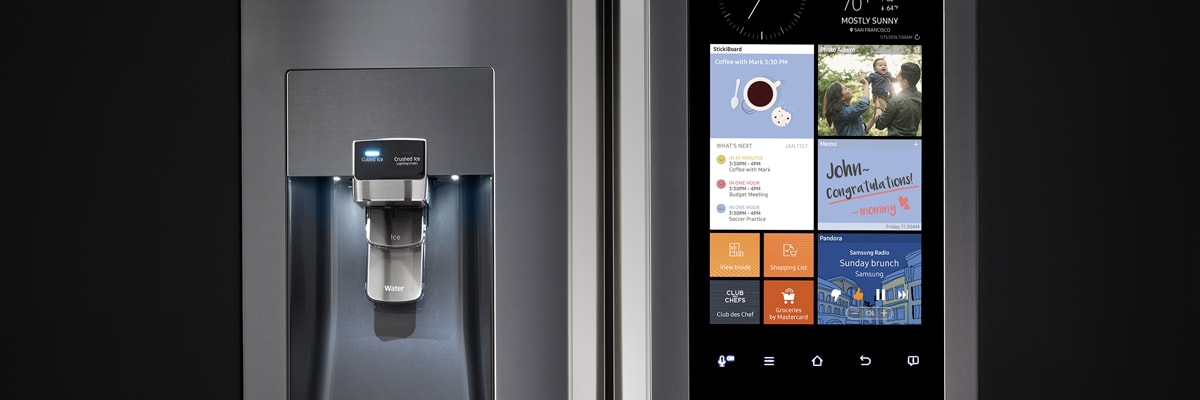
Return navigate_next
Does Your Home Really Need a Smart Fridge?
September 1, 2021 *
Believe it or not, frugal shoppers can still buy a basic, full-sized, Energy-Star rated fridge from a brand-name company for about $600. At the other end of the scale, the cheapest Samsung smart fridge costs about $1,600. Further, some Samsung Family Hub fridges come with price tags as high as $6,000.
Fridges with connected tech cost considerably more than their unconnected counterparts. At the same time, smart features may offer convenience and reduce waste. Take some time to explore the advantages and disadvantages of smart fridges and other connected appliances below.
Are Smart Fridges Worth the Extra Money?
Harvard Business School weighed in on the obvious benefits of smart fridges for companies like Samsung. Sure, homes need fridges. At the same time, most families purchase one and rely upon it for decades. Families typically replace their refrigerator when the high cost of repairs makes that an attractive decision.

By introducing connected appliances, Samsung managed to elevate this sort of appliance from a basic need to something people want to enjoy as a major upgrade.
As for the potential benefits of smart fridges for consumers:
- People can use the app to see inside the fridge while they’re making a shopping list or at the grocery store.
- Some models can even detect expiration dates and send alerts when it’s time to buy a new bottle of ketchup or jar of mayo.
- Family Hub fridges come with a tablet on the front that people can use to communicate or post reminders. This replaces the traditional standby of using magnets to stick notes on the door.
What Are the Disadvantages of Smart Fridges?
If the only disadvantage concerns the higher price tag, some people might still pay extra for handy features. Forbes agreed that connected appliances might provide additional convenience. On the other hand, they warned readers that this benefit might come at the price of additional security risks and loss of privacy.

For instance:
- Security: Newsweek reported on the concerns of security experts about connecting smart appliances to home WiFi networks. They said that major computer and smartphone manufacturers have invested in security for years, but not all connected devices come with the same assurances.
- Privacy: Manufacturers may profit by selling both expensive hardware and consumer data. As just one example, Samsung recently had to add more privacy protection warnings and options to conform with new regulations in California according to Computerworld.
Before investing in any smart appliances, informed consumers should take the time to investigate how the seller plans to use the information they gather. If the fridge knows when the ketchup expires, it probably also knows the brand.
In addition, consumers should make sure the manufacturer has taken steps to keep hackers from entering their home network through the door of their smart fridge, oven, or other connected appliance.
How to Protect an Investment in Smart Fridges
As consumers consider the advantages and disadvantages of connected appliances, they should also consider the pros and cons of extended warranties for smart fridges. These appliances don’t just keep food cool, they also include computer and connectivity devices. A smart fridge does more than a basic fridge so it also comes with more vulnerabilities.

Just a few examples of an Upsie extended warranty coverage for a refrigerator include:
- Their plans cost less than the average cost of one repair.
- Upsie lets customers choose a three- or five-year warranty up to 11 months after purchasing the appliance, so nobody needs to make a rushed decision at the sales counter.
- They process claims 24-7, send certified technicians to the home, and do not charge service fees or deductibles.
Even better, Upsie’s direct sales model allows them to charge less than other well-known warranty companies. To get started, visit the Upsie refrigerator extended warranty page to view plan options, coverage details, and prices.
Learn More About Appliances:
* This article is over 6 months old and may or may not be updated.
